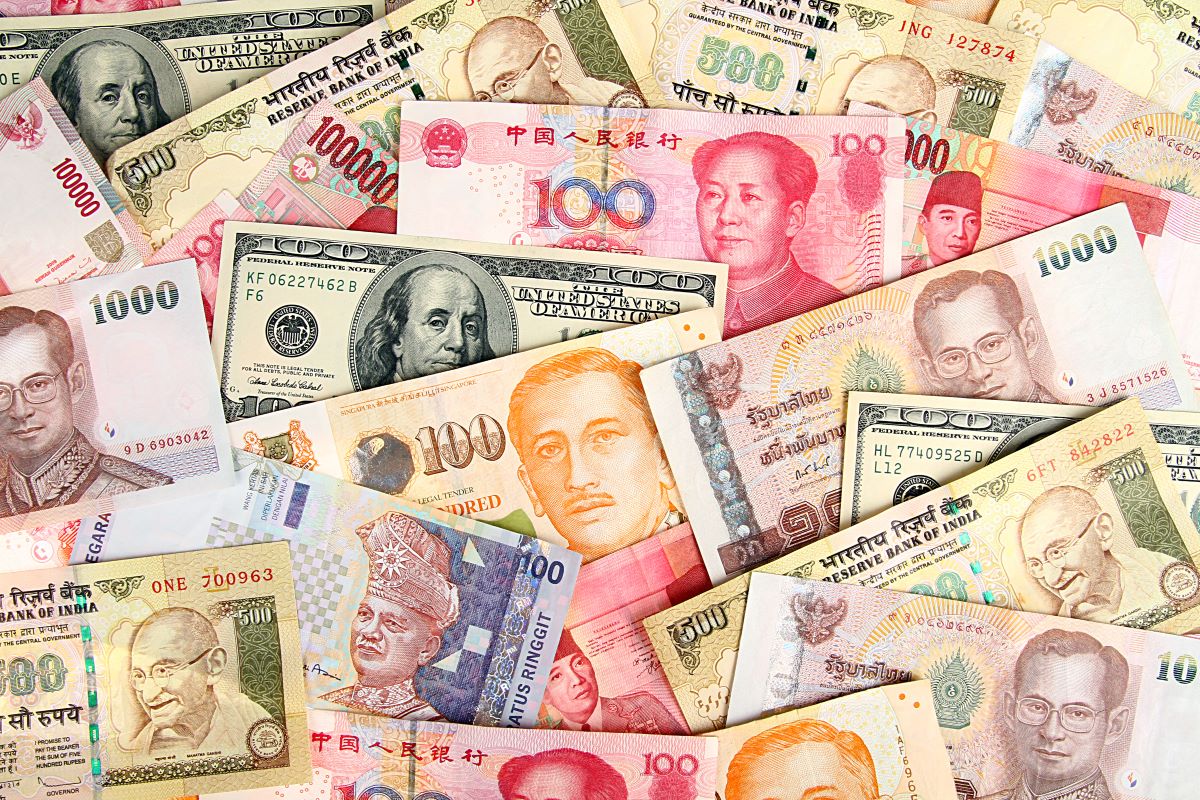Asian currencies witnessed extreme downward pressure and traded near their lowest levels in 2023 since Tuesday as higher interest rates both at home and in the US and Europe have begun to impact regional economies.
The Japanese yen, South Korean won and Thai baht all recently slumped to nearly 10-11 months low against the US-dollar since November 2022. The yen remains above 149 yen per dollar, the won fell to 1354.6 per dollar, while the Thai Baht slipped to 36.5 per dollar.
The weakness in Asian currency stems from the hawkish stance of the U.S. Federal Reserve. The Fed kept interest rates at a 22-year high on Sept. 20 but indicated possibilities of further rate hikes.
The US Fed’s indications for further rate hikes led to the widening of the rate differentials between US and Asian economies. An increase in the Fed’s interest rate caused foreign investors to withdraw their investments from Asian countries with lower interest rates, thereby causing currency weakness. To add to it, the slowdown of economic growth in Asia has dented sentiment.
Several Asian central banks hiked their benchmark rates in 2022, but they kept them steady for most of 2023, considering the previous rate hikes enough to stem the inflationary trend.
A look at the main currencies
The Japanese currency slipped to 149 against the greenback on Tuesday. The yen was also hit by dovish comments from Bank of Japan (BOJ) Governeur Kazuo Ueda, who reiterated the central bank’s commitment to ultra-easy monetary policy and doused speculation that the BOJ would shift to tightening as early as December. “With Japan’s long-term interest rate hovering around 0.6%, but with the US and Europe still tightening at much higher rates, the BOJ clearly has much more policy leeway than its global peers,” says Nikko Asset Management.
The yen hit the lowest since October 2022 even after Japanese Finance Minister Shunichi Suzuki cautioned against excessive fluctuations. “We are closely watching currency moves with a high sense of urgency,” said Suzuki. The minister also warned that Japan is trying to secure the consent of its key Group of Seven (G7) allies to take stringent action if needed.
The Chinese yuan slipped to 7.34 yuan per dollar earlier in September, the lowest since December 2007. Analysts expect the yuan to slide further amid a weak economic outlook and sustainably lower yields. “Against a broadly stronger USD, this implies more downside over the coming months (USD/CNY may surpass 7.50), though the renewed USD weakness we foresee for the dear USD points for 2024 and beyond points to a subsequent stabilisation in USD/CNY,” predicts Generali Insurance AM.
Meanwhile, the Thai baht plunged to at 36.81 per dollar, its lowest in more than 10 months on Thursday, amid rising concerns over the country’s fiscal outlook. The baht is among the worst-performing Asian currencies this year. Yesterday, the Bank of Thailand (BoT) hiked its key interest rate for an eighth straight month, despite a slowdown in economic growth, below-target inflation, and rising global uncertainties. Economists believe that the Thai baht is likely to see more downside and could come under pressure from sales of Thai assets by foreign investors. They also ruled out a rebound in the short term.
Earlier this week, the Indian rupee posted its highest monthly decline following a stronger US dollar and an increase in crude oil prices by more than 10% to reach $85 per barrel. As over 80% of India’s crude oil is imported, the weakening rupee has led to excessive inflation.
Monetary authorities keenly watch the US Dollar
The US dollar’s recent strength is underpinned by rising interest rates and the surging global crude oil prices. Asian countries are already contemplating moves to curb further currency declines against the dollar. Japan has already declared its intention to intervene in case of extreme currency fluctuation. Meanwhile, China’s central bank slashed the amount of foreign currency deposits to be held by financial institutions by a third.


 Australia
Australia China
China India
India Indonesia
Indonesia Japan
Japan Malaysia
Malaysia Philippines
Philippines Singapore
Singapore South Korea
South Korea Taiwan
Taiwan Thailand
Thailand Vietnam
Vietnam







